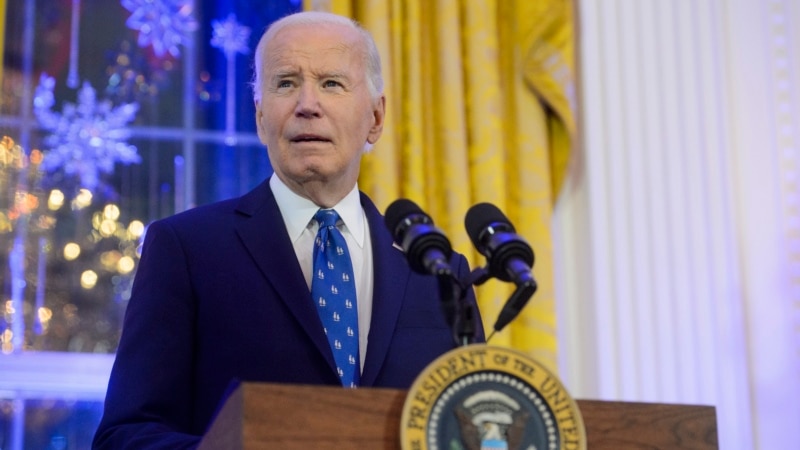
President Joe Biden has pledged to reduce U.S. greenhouse gas emissions by more than 60% by 2035 as he fights to secure his legacy in slowing global warming, even as President-elect Donald Trump vows to undo much of it. to work in Biden climate matter cWhen he takes office next month.
Biden indicated that the new goal — which surpasses an earlier plan to cut carbon emissions by at least half by 2030 — keeps the United States on track to achieve net zero greenhouse gas emissions across the economy by 2050. The United States is making a formal presentation of the new goal, known as a Nationally Determined Contribution, to the United Nations under the terms of the 2015 Paris climate agreement, Biden said Thursday.
The new objective requires reduce net emissions between 61% and 66% below 2005 levels in 2035.
“I am proud that my administration is pursuing the boldest climate agenda in American history,” Biden said in a videotaped statement.
“We’re doing it by setting ambitious goals,” such as deploying 30 gigawatts of offshore wind and conserving at least 30% of U.S. lands and waters by 2030, Biden said. His administration has also set strict new standards to reduce air pollution from cars, trucks and power plants and signed into law the most significant climate and clean energy investments in U.S. history, he said.
The Democratic president’s action comes just over a month before he is scheduled to leave office. Trump has already promised to unleash a series of executive actions that will seek to undo most or all of Biden’s climate agendas as the Republican president-elect pushes for “energy dominance” around the world.
Trump no longer dismisses climate change as a “hoax” but has promised to dismantle what he calls Democrats’ “new green scam” in favor of increasing production of fossil fuels such as oil, natural gas and coal, main causes of climate change. Trump is expected to withdraw the United States from the Paris climate agreement, as he did during his first term, and will likely move to repeal parts of the landmark Inflation Reduction Act, especially subsidies benefiting electric vehicles and offshore wind energy.
Biden aides have sought to downplay the impact of Trump’s return to the White House, insisting that states and local governments can continue to lead on clean energy.
“American climate leadership is determined by much more than who occupies the Oval Office,” said John Podesta, Biden’s senior adviser for international climate policy.
Climate leadership “happens on the ground in our cities and states, from Phoenix to Pittsburgh, from Boise to Baltimore,” Podesta told reporters Wednesday. “And I believe that with this new goal of 2035 as their North Star, leaders across America can show the world that we are still in this fight for a better future.”
Podesta disputed any notion of “wishful thinking,” adding that he is confident that “the work to contain climate change will continue in the United States with commitment and passion.”
Biden, in his remarks, called the new goal “ambitious” and said it would lead to thousands of good-paying jobs, more affordable energy, cleaner air, cleaner water and a healthier environment for all Americans.
“It’s also creating real momentum because we’re unleashing American engineering and innovation. And together, we will turn this existential threat into a once-in-a-generation opportunity to transform our nation” for decades to come, Biden said. “I know we can do this.”
The proposal would require sustained changes across the economy, from power generation to transportation, buildings, agriculture and industry, including significant increases in renewable energy like wind and solar and steep cuts in emissions from fossil fuels like oil and coal. .
The United States’ commitment includes methane reductions of at least 35% from 2005 levels by 2035, Biden said. Reducing methane emissions is one of the fastest ways to reduce short-term warming and is crucial to reducing greenhouse gas emissions.
The non-binding but symbolically important commitment is a key part of the Paris agreement, which requires countries to submit so-called Nationally Determined Contributions (NDCs) every five years. A country’s determined contribution, or climate target, describes how it plans to reduce greenhouse gas emissions to help achieve the global goal of limiting temperature rise to 1.5 degrees Celsius since pre-industrial times.
The Paris Agreement requires that NDCs be updated every five years with increasing ambition, taking into account the capacity of each country. The next deadline is February 2025, although Brazil, the United Kingdom and the United Arab Emirates have already submitted their proposed CDNs.
Connect with the Voice of America! Subscribe to our channels YouTube, WhatsApp and to newsletter. Turn on notifications and follow us on Facebook, x and instagram.















Add Comment